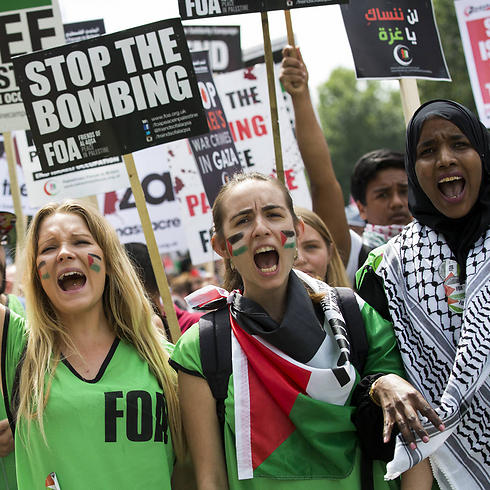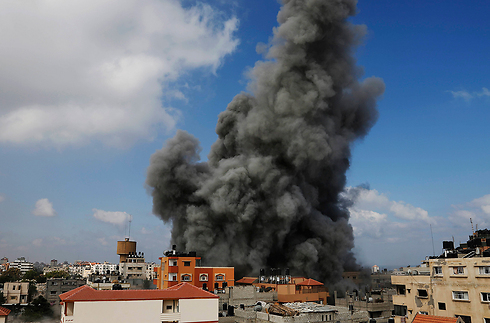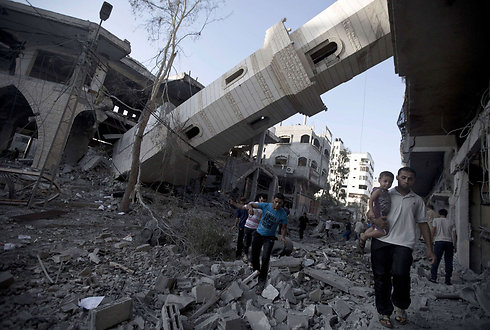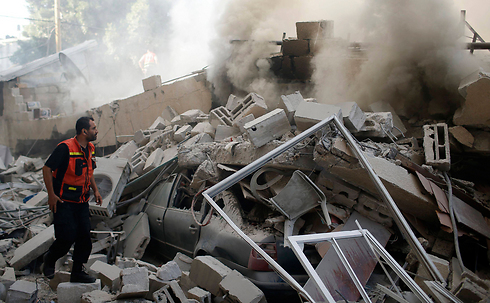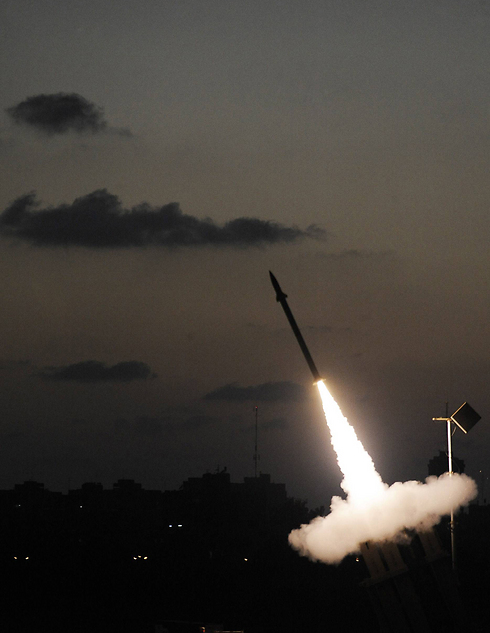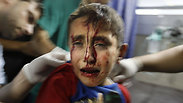
'Smashing a peanut with a hammer': Foreign journalists on int'l coverage of Gaza fighting
Since Gaza op started, IDF released scores of videos of pilots calling off strikes and Israel urging Gazans to evacuate, but foreign reporters tell Ynet that in Europe a photo of dead Palestinians is worth more than a thousand Israeli words.
While Israel continues to highlight its efforts to avoid civilian casualties in Gaza, European public opinion proves that in foreign eyes, it’s not the intent that counts.
Since the beginning of Operation Protective Edge, the IDF has published videos of pilots calling off air raids, officers have called civilians to evacuate, and Prime Minister Benjamin Netanyahu has warned the international community of Hamas’ use of human shields – however, it appears that Israel’s critics abroad refuse to let the facts throw them off.
Related stories:
- Bloody Sunday: Over 100 Palestinians killed on 13th day of operation
- 19 Palestinians killed in IDF shelling near UNRWA school
- 18 Palestinians killed in IAF strike in Gaza City
“Most see the number of civilian victims as an indicator of the moral upper hand,” explained Mikkel Andersson, a Danish journalist. “They assume that if so many die from Israeli attacks, it necessarily implies callousness or intent."
Andersson stressed that those who believe the civilian losses are intentional are by far a minority. However, it is the majority that ultimately cares only about the end result of Israel's many efforts to protect innocent civilians – a fact that does not encourage positive coverage of Israel's military actions. Denmark is not alone – Israel is having trouble winning over the public in most of western Europe.
“The Spanish people are used to supporting the weaker side of every conflict,” pointed out Spanish journalist Miguel Angel Benedicto, who recently wrote an article about life under fire in Israel after visiting the country. “It’s difficult for us to understand the ‘eye for an eye’ policy, we think negotiations would be better.”
'Iron Dome damages Hasbara efforts'
“In the eyes of the international community, the operation seems like a disproportionate overreaction, like using a hammer to crush a peanut,” continued Leo Cendrowicz, a British journalist working in Belgium.
“There is a feeling that the Israeli government is run by hardliners who have created a mission for themselves and who do not care about the international public opinion. In Belgium there’s a general agreement that even if Hamas must pay, the Palestinian people shouldn’t suffer.”
While journalists all claim that the media in their country paint a fair picture of the conflict - remembering to also mentioning the rocket barrages from Gaza and Israel’s attempt to spare innocents – it appears that the balanced coverage has had a limited influence on its audience.
"Belgian newspapers are currently debating over whether it’s right to compare the aerial strikes on Gaza to the rockets fired on Israel, since the attacks on Gaza seem to be far more destructive,” Cendrowicz said. “On the other hand, unlike the rockets, the raids do not target civilians."
Andersson indicated that a similar dilemma exists in Denmark: “Most Danes have no love for Hamas, but they view its actions as a product of Israeli occupation. To Israelis it might seem as an utterly bizarre conclusion, but the Gaza operation would have probably been perceived as far more justified if it weren't for the Iron Dome system and if Hamas had succeeded in launching a truly devastating attack on civilians."
“I believe that the inventors of the Iron Dome deserve a Nobel prize, but PR-wise, it definitely put Israel at a disadvantage,” agreed Esther Voet, director of CIDI – an independent Dutch organization backed by the Jewish community, which provides information about Israel and the challenges with which it deals.
“The stream of rockets from Gaza and the fact that Hamas has refused to ceasefire three times both have an effect on public opinion,” she explained.
“But the Netherlands, which is a small country, has an innate tendency to support the underdog. If in 1967 and in 1973 people here drove around with bumper stickers saying 'I support Israel', now you don't see that anymore. Nowadays Israel has the upper hand and it supposedly became the neighborhood bully. It fell victim to its own success.”
'Most Europeans can't point out Gaza on a map'
Since the beginning of the escalation, CIDI has been trying to present Israel’s stance through articles, interviews, and active lobbying. The organization is not alone in its efforts – the Brussels-based Europe Israel Press Association (EIPA) assists European journalists reporting on the Middle East, organizes delegations and briefings, and sends daily updates on the situation.
“Israel must highlight its status as the only democracy in the region, with an army that upholds values and moral norms,” asserted Yossi Lempkowicz, manager of EIPA’s media activity in Europe.
“In order to influence someone’s mind, one needs to provide facts, background information, and a rational explanation - not propaganda, like Hamas. In the end, the truth will come out,” he assured.
The European journalists agreed that their audience is lacking information: "Denmark is a country in which civilians have absolutely no experience with warfare, and the majority of them have no idea of the meaning of urban guerrilla warfare against an enemy intentionally embedded in civilian areas,” Andersson explained.
“Honestly, I doubt that many Danes - or Western Europeans, for that matter - would be able to point out Gaza on a map if it was not labeled."
“In general, I think the most reasonable thing to do is to explain the complexities of the situation and to counter misconceptions, of which there are many,” he continued.
“For example, the fact that Hamas deliberately and systematically hides behind civilians is often overlooked or trivialized. When Israel encouraged the civilian evacuation of neighborhoods in northern Gaza, many did not view Hamas' order to civilians to stay put as problematic, thinking ‘they had nowhere to go anyway, since Gaza is so tiny’.
They were unable to tell the difference between the relative safety of a UN-run refugee camp, as opposed to being in an area of intense fighting. I think it is extremely hard to change peoples' fundamental views on the conflict either way, but it is possible to convince some that the situation is more complex than they thought.”
But while Israel tries to convey its point of view using charts, facts, and figures, the Palestinians are proving that a picture is worth a thousand words. “There is no doubt that photos from Gaza have a stronger effect on public opinion than the ones from Israel,” the European journalists said in unison all.
Referring to this issue, Lempkowicz stated that “by now the public has become accustomed to horrific images from the area,” but the other foreign press representatives held differing views. “I don’t mean to sound cynical,” admitted Cendrowicz, “but Israel needs to show more images of death and destruction on its side, to show the repercussions of the rocket attacks and the damage they (Hamas) caused, if there was such.”
'Photos of destruction in Israel not severe enough'
The British reporter suggested fighting fire with fire: “Nowadays the images from Gaza rule the press and only rarely are images from Israel shown.
"Stories like the four Palestinian teens killed by a bombing of Gaza’s shoreline, have more influence and portray the Palestinians as victims.”
In the Netherlands, however, Voet called for the use of a different tactic: “The photos of the destruction on the Israeli side won't work because they aren't severe enough and they don't touch enough people. Instead, we must keep emotions out of the conflict and emphasize reason.”
The desire to appeal to logic led her to publish an op-ed when the ground operation was days away, in which she warned of the day the photos of the destruction in Gaza would be published.
“This conflict revolves around image, and I explained the nature of the asymmetric combat in Gaza, and warned that once these photos will come out, Israel will lose in the court of public opinion and Hamas will win. I think it helped to fight against those images. The article received a lot of reactions, especially from people who don't think in black or white.”
According to Voet, the criticism from the international community stems from a wider problem: “One cannot look with western eyes at the Israeli-Palestinian, because the mentality of the Arab world is completely different.
"We are measuring a western country, Israel, by western standards without understanding the area surrounding it. Just look at the political mistakes made by the west in Iraq and in Syria. The west forgets that it's a very colonial way of thinking. The problem is that Israel also perceives itself through western ideals – and of course, I'm hoping it won't forget its moral principles – but then, when four children are killed, Israel loses.”
Fighting a losing battle?
Israelis often feel that the attempt to win over the European public is a lost cause, mainly because of the growing Muslim population and the anti-Semitism, which is not so latent anymore.
Swastikas and signs comparing Israel to Hitler were spotted recently at many of the demonstrations against Israel around the world. “It’s happening more and more,” affirmed Lempkowicz, who resides in Brussels. “The demonstrators are calling for the murder of Jews and compare the Israelis to Nazis, often with the support of political leaders like the Turkish Prime Minister Erdogan.
"Anti-zionism necessary leads nowadays to anti-Semitism. The European authorities condemn this in statements, but they must also ban such demonstrations.
Voet also admitted she sometimes feels as if she is the most hated women in the Netherlands. “I’m at the forefront, so I get a lot of heat,” she told.
“Now most of the anti-Semitic incidents occur on social networks. The worst response I received was on Tweeter, when someone wrote: 'Don't worry, the second holocaust in coming, Allah will see to that.' In a different incident a rapper speaking in front of 3,000 people called me the most condemnable person in the Netherlands.'” Despite this, Voet insisted that the manifestations of anti-Semitism are not as widespread as they were during operation Cast Lead, for example.
Moreover, she claimed that the comparison between anti-Semitism and the foreign criticism of Israel is the worst mistake Israel can make. “In some places the two things overlap, and of course there are people who hide behind the statement 'I'm not an antisemite, I'm an anti-zionist' – but dismissing all foreign criticism is deadly in the European arena.
"Israel is lowering itself by being dragged into this discussion. I've heard these claims from Israeli politicians as well, and that makes our lives here at CIDI very difficult.”
Instead of complaining of prejudice, the pro-Israel activists celebrate their relative success. “In my view, Israel had managed to convey to the world the goals of the current operation and the fact that it’s not at war with the people of Gaza, and the foreign press also presented the Israeli narrative much more than in the past,” reminded Lempkowicz.
“However, the general public opinion is always manipulated more by extremists, who are more active than the political center, and the growing jihadism also plays a part in that.”
Voet who also noted that media reports of the current operation are more balanced than those that preceded it, further stressed that the ability to change one's mind depends on his openness towards other opinions.
“We have a large percentage of Muslims and only few want to listen, but I believe people won't hate Israel 'no matter what.' I even have proof: Recently a member of the socialist party, which always supported the Palestinians, demanded sanctions against Hamas and the PA in an interview on Dutch television. This is a voice we haven't heard before. There are also many people who choose sides without knowing anything of the conflict and that's disturbing.”
Voet also pointed at a trend of radicalization in the Netherlands and in Europe in general, yet saw this as an opportunity waiting to be seized: “Israel needs to emphasize that this is not an Israeli-Palestinian conflict, this is an Arab-Israeli conflict, and to remind that it is dealing with all the scary forces which are currently rising in the Arab world, ISIS and al-Qaeda, because we have them here as well and we are scared.
"In my opinion, people are beginning to understand that Israel is at the front line against even more radical forces, and once a common enemy will emerge, these forces might bring together the moderate voices both on the Palestinian and on the Israeli sides.”
*This story was first published in Hebrew on 31/7/2014 before a ceasefire was reached










